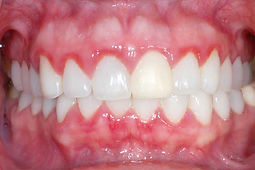DENTAL CARE DURING PREGNANCY
Pediatrics all encourage women to get dental care while pregnant. It is acrucial period of time in a woman’s life and maintaining oral health is directly related to good overall health Dental treatment can be done at any time during pregnancy. However, the best time to perform elective dental treatment duringpregnancy is in the second trimester, weeks 14 through 20. By this time, the
development of the fetal organs is complete and the risk of side effects is lower. Before you have your dental appointment, check with your obstetrician to see if she has any special precautions/instructions for you.

X-Rays:
According to the ADA and ACOG, having dental X-rays during yourpregnancy is considered safe with appropriate shielding.
Medication:
If dental work is needed, the amount of anesthesia administered should be as little as possible, but still enough to make you comfortable. Dental work often requires antibiotics to prevent or treat infections. Antibiotics such as penicillin, amoxicillin, and clindamycin, which are labeled category B for safety in pregnancy, maybe prescribed after your procedure.
PREGNANCY GINGIVITIS

Pregnancy gingivitis is caused by a rise in the hormone progesterone which can contribute to an increase in the flow of blood to gum tissues making them sensitive, swollen and more likely to bleed when you brush and floss. Left untreated, gingivitis can lead to more serious forms of gum disease. Your dentist may recommend more frequent cleanings to prevent this.
PREGNANCY TUMOR
Pregnancy tumors — also known as pyogenic granulomas — are not
cancerous; they are hemorrhagic swellings that occur mostly in the gum
tissue of pregnant women. Because pregnancy tumors are often caused by the hormonal changes in a pregnant woman's body, they often disappear after the baby is born. However, anytime you experience bleeding gums or unexplained swelling, you should see your dentist for an evaluation.

IMPROVE YOUR DENTAL HEALTH DURING PREGNANCY
Nutrition:
Good nutrition during pregnancy will affect the dental health of the baby as well as the mother. The baby's dental development starts from the second month of pregnancy. For healthy tooth development, foods rich in calcium, phosphorus and vitamin should be taken sufficiently. Candidates should avoid junk food from the first month of pregnancy. All food residues that are not removed from the mouth accumulate on the teeth and accelerate the formation of caries.


Oral care:
In the first months of pregnancy, vomiting, changing eating habits and hormonal changes may cause tenderness and bleeding in the gums. Pregnant mothers should not stop brushing teeth because of bleeding. Gingivitis can be prevented by effective care and cleaning of the teeth and gums. Teeth should be brushed at least twice a day, if possible after each meal. The teeth should be cleaned with floss. Oral mouthwash should not be used unless recommended by the dentist.
The idea that “every pregnancy makes the mother lose a tooth tır is a false belief. There is no scientific evidence that the mother lost calcium from her teeth during pregnancy. You should take foods rich in vitamin D, calcium (1200-1500mg daily), vitamin C and B12. If sufficient calcium is not taken with food, the amount required for the baby's development is met by the mother's bones. No calcium dissolution from teeth.
Source: www.tdb.org.tr


